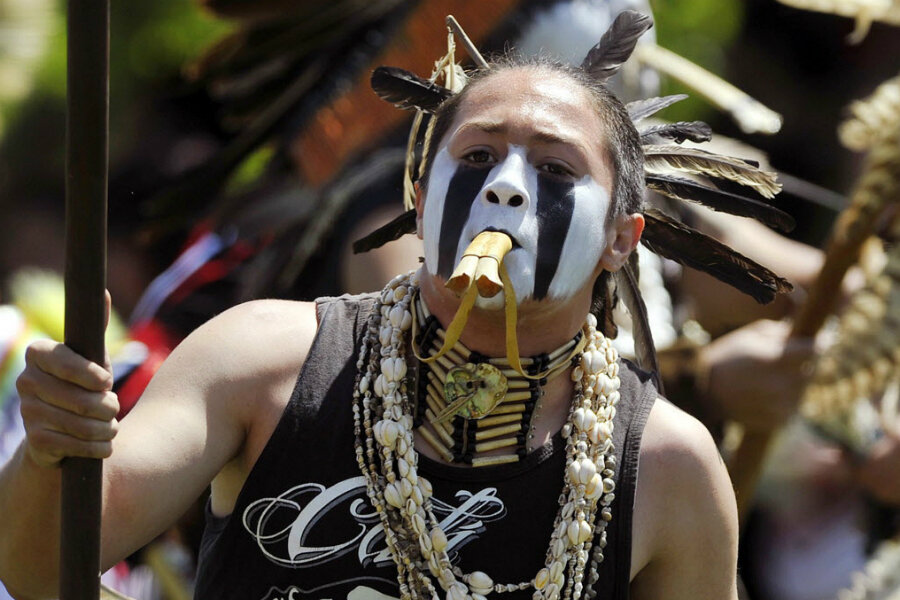Native American student sues to wear eagle feather at graduation
Loading...
Should a graduating high school student be allowed to wear an eagle feather – an item with cultural and religious significance to him, as a member of a native American tribe – at his graduation ceremony?
His school district has said no, but Christian Titman filed a lawsuit Monday asserting his free-speech and religious-freedom rights under the state constitution and California's education code. A hearing was to be held Tuesday afternoon, and Mr. Titman hopes for a decision before his graduation ceremony on Thursday.
It's not the first time free-speech questions have come up with regard to graduations, and it's also not the first time an eagle feather has been the subject of controversy for a native American student. But free-speech experts say Titman's case is particularly strong given the protections that California students have under the state's education code, as well as the religious freedoms guaranteed by the state constitution.
"If you look at the actual language of the California constitution, it says the practice of religion is guaranteed, and then says you don’t have a religious right to engage in practices that are licentious or bad for peace or the safety of the state," says Aaron Caplan, a professor at Loyola Law School in Los Angeles.
"It seems to me that the right way to interpret the California constitution is to say that, in general, free exercise [of religion] is guaranteed," he adds. "It's not like he’s asking to do anything that’s going to cause a problem."
Titman, who is a student at Clovis High School near Fresno, Calif., and is a member of the Pit River Tribe, has said the eagle feather is an important symbol to him of his accomplishment. Eagles are revered in many tribes, and their feathers are often given to honor someone or mark personal achievement. And while US law bans the trade of eagles, native American tribes are exempted from that ban, and can gift eagle feathers or parts of eagles found in the wild. The eagle feather that Titman wants to wear comes from an eagle his father was given by the National Eagle Repository. His father and grandfather planned to present him with the feather, about five inches long, before the ceremony on Thursday, and he planned to wear it on his cap.
“The eagle feather is not only a signature of my tribe but it also represents the pride I have for my tribe, my people and my heritage,” Titman told the Fresno Bee. “When I have feathers on I’m connected with ancestors before me.”
But the school district says that its dress code is implemented in a neutral way that doesn't discriminate against religious beliefs – the school doesn't allow leis, rosaries, stoles, or necklaces outside the graduation robe or on the cap. And the district argued that it has a legitimate interest in the "uniformity and unity" of the students' caps and gowns, along with "avoiding the disruption" that would take place if they were allowed to alter them.
Because the school's policy is neutrally applied, "the dress code does not violate the free exercise of religion, even though it may incidentally affect a particular religious belief," the superintendent wrote in response to a formal request sent, on Titman's behalf, by the ACLU of Northern California and two native American groups. The superintendent suggested that Titman could put the feather on his cap after the ceremony instead.
That solution was unacceptable to Titman. "Graduation only happens once, and graduating from high school is a big accomplishment," says Novella Coleman, a staff attorney with the ACLU of Northern California. "If he puts on the feather on afterward, the graduation is over. He wants to convey this message during the graduation." She adds that "this is one of those rare occasions where a student is wanting to express himself in a way that is noncontroversial."
Just last month, in a decision also cited by the district in its letter, a similar issue came up in Oklahoma. In that case, a court denied the student's request to wear an eagle feather on her graduation cap, noting that since graduation is a school-sponsored event, the student's speech – including her clothing – is school-sponsored speech. And since the student's religion "doesn't require her to wear the eagle feather at graduation," the inability to wear the feather doesn't place "a substantial burden on her free exercise of religion."
But the case under California law is different, say Ms. Coleman and legal experts. Not only does the California constitution guarantee religious freedoms, but several education codes in the state offer a high measure of free-speech protection.
Most notably, one code guarantees students' right to the wearing of "buttons, badges, and other insignia." And even Titman's district allows students to wear National Honor Society sashes and several pins from the California Scholastic Federation signifying academic achievement – something that Titman's lawyers say should be seen as analogous to the eagle feather which, to Titman, is a mark of achievement.
"One could argue that [the statute] shouldn’t extend to a school-organized pageant where students are supposed to have a particular homogeneous look, but there’s nothing in the statute that talks about that," says Eugene Volokh, who teaches free-speech law at the University of California in Los Angeles.
Under the US Constitution, Professor Volokh notes, schools have been given a fair amount of leeway to curtail student speech, particularly at school-sponsored events, and when it comes to religious freedoms, it's generally been interpreted as barring religious discrimination, not guarantee free exercise of religion.
"But when it comes to specific California statutes," Volokh says, "it looks like he’s got a pretty good argument."








